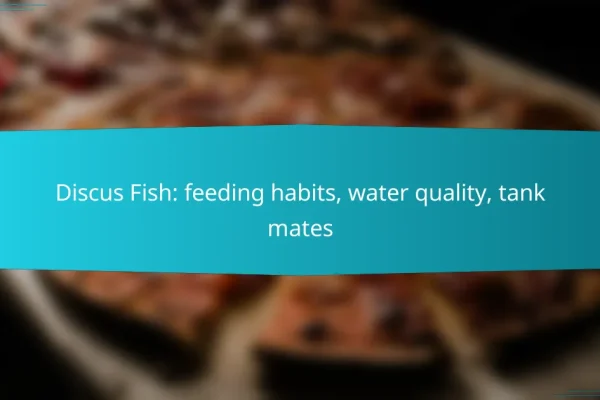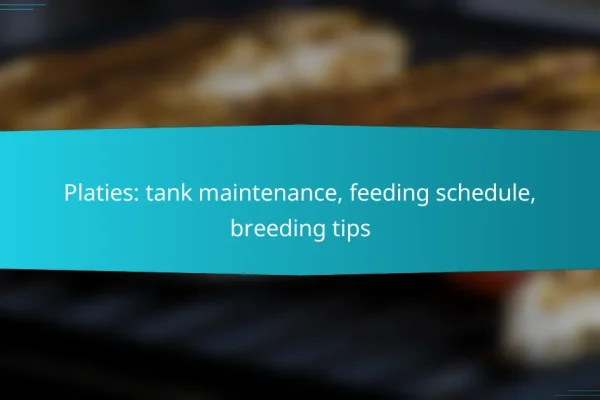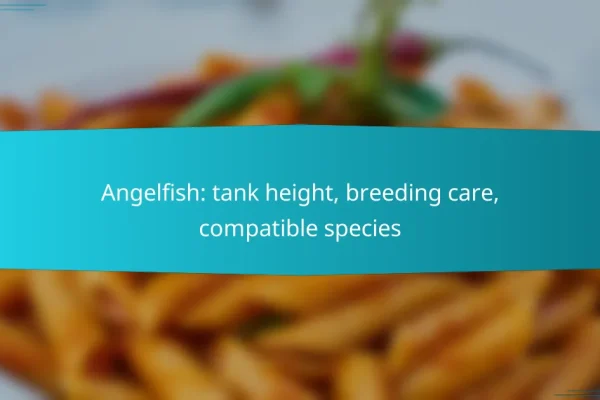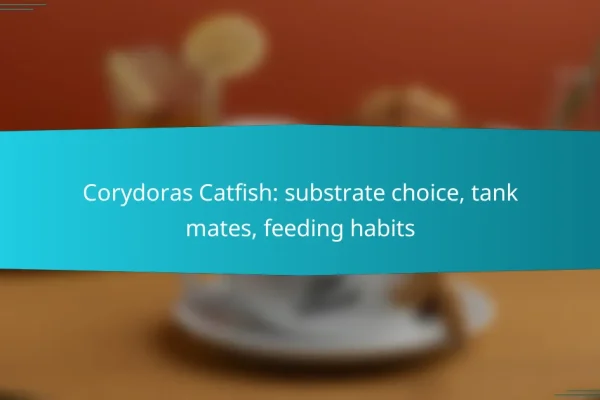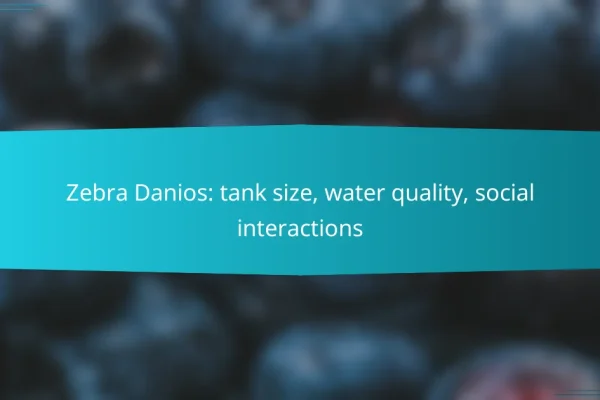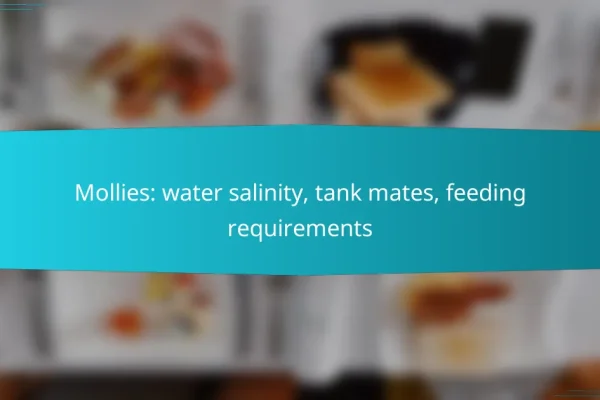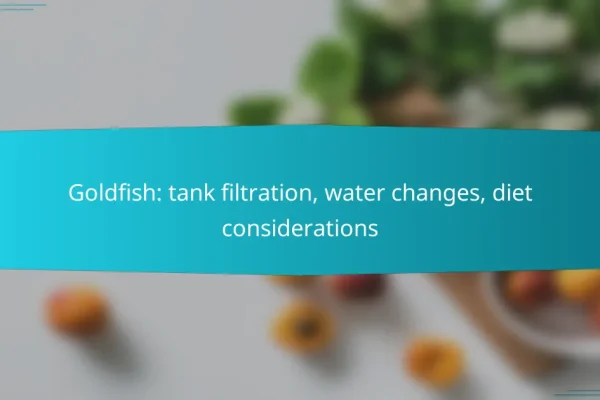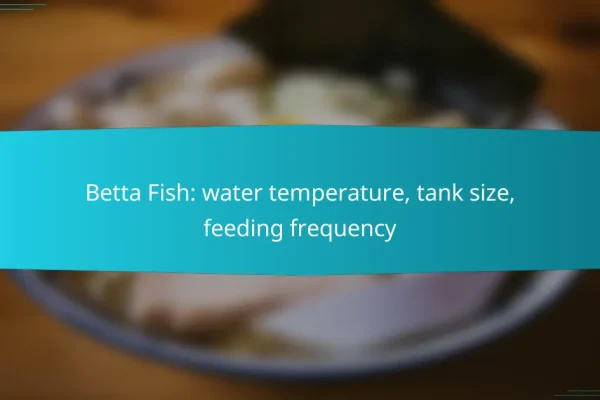How to maintain water quality in your aquarium?
Maintaining water quality in your aquarium is essential for the health of your fish. Regular monitoring and adjustments ensure a stable environment that supports aquatic life.
Regular water testing
Regular water testing is crucial to monitor parameters like pH, ammonia, nitrite, and nitrate levels. Use a reliable test kit to check these values weekly or bi-weekly, depending on your tank’s bioload.
Keep a log of your test results to identify trends over time. This can help you catch any potential issues before they become serious problems for your fish.
Using water conditioners
Water conditioners help neutralize harmful substances in tap water, such as chlorine and chloramine. Always treat new water with a conditioner before adding it to your aquarium.
Some conditioners also detoxify ammonia and heavy metals, providing an extra layer of protection for your fish. Choose a product that suits your specific water quality needs.
Performing water changes
Performing regular water changes is vital for removing toxins and replenishing essential minerals. Aim for a 10-20% water change weekly or a 25-50% change every two weeks, depending on the tank’s size and stocking level.
When changing water, make sure to match the temperature and pH of the new water to the existing aquarium water to avoid shocking your fish.
Maintaining proper filtration
Proper filtration is essential for keeping your aquarium water clean and clear. Ensure your filter is appropriate for your tank size and type of fish, and clean it regularly to maintain efficiency.
Consider using a combination of mechanical, chemical, and biological filtration to effectively manage waste and toxins in the water.
Controlling temperature
Controlling the temperature in your aquarium is critical for fish health, as most species thrive within specific temperature ranges. Use a reliable heater or chiller to maintain a stable temperature suited to your fish species.
Regularly check the temperature with a thermometer and adjust as necessary, keeping fluctuations minimal to prevent stress on your fish.
What do aquarium fish need for a healthy diet?
A healthy diet for aquarium fish includes a balanced mix of high-quality fish flakes, frozen or live food options, and vegetable supplements. Providing a variety of foods ensures that fish receive essential nutrients, promoting their overall health and vitality.
High-quality fish flakes
High-quality fish flakes are a staple in many aquarium diets, offering a convenient source of essential vitamins and minerals. Look for flakes that list whole fish or fish meal as the primary ingredient, as these provide better nutrition than fillers. It’s advisable to choose products specifically formulated for the type of fish you have, whether freshwater or saltwater.
Frozen or live food options
Frozen or live food options, such as brine shrimp, bloodworms, or daphnia, can enhance the diet of aquarium fish by providing protein and stimulating natural hunting behaviors. These foods are often richer in nutrients compared to dry flakes. When introducing live food, ensure it is sourced from reputable suppliers to avoid introducing diseases into your aquarium.
Vegetable supplements
Vegetable supplements, such as spirulina flakes or blanched peas, are important for herbivorous and omnivorous fish. These foods provide essential fiber and nutrients that support digestion and overall health. Incorporating vegetables into their diet can also help prevent issues like constipation and promote vibrant colors.
Feeding frequency guidelines
Feeding frequency varies by species, but a general guideline is to feed adult fish once or twice a day, providing only what they can consume in a few minutes. Young or growing fish may require more frequent feedings, up to three times a day. Overfeeding can lead to water quality issues, so it’s crucial to monitor their intake and adjust accordingly.
How to prevent common fish diseases?
Preventing common fish diseases involves maintaining a healthy environment and monitoring fish behavior. Key practices include quarantining new arrivals, ensuring tank cleanliness, recognizing symptoms early, and using medications appropriately.
Quarantining new fish
Quarantining new fish is essential to prevent the introduction of diseases into your established aquarium. Keep new fish in a separate tank for at least two weeks to observe for any signs of illness before adding them to the main tank.
During this period, monitor their behavior and health closely. If any symptoms arise, treat them in isolation to avoid contaminating your primary aquarium.
Maintaining tank cleanliness
Regular tank maintenance is crucial for preventing fish diseases. Perform partial water changes weekly, removing about 10-20% of the water to keep it clean and free from harmful toxins.
Additionally, clean the substrate and decorations to remove uneaten food and waste. Use a gravel vacuum and avoid overfeeding to maintain water quality.
Recognizing disease symptoms
Being able to recognize disease symptoms early can save your fish. Common signs include changes in behavior, such as lethargy, loss of appetite, or abnormal swimming patterns.
Look for physical symptoms like discoloration, lesions, or fin rot. Familiarize yourself with the specific symptoms of diseases common to your fish species for better identification.
Using medications effectively
When using medications, follow the instructions carefully to ensure effectiveness and avoid harming your fish. Choose treatments based on the specific disease identified and the species of fish you have.
Always treat fish in a quarantine tank first if possible, and monitor their response to the medication. Be cautious with dosage and duration, as overmedicating can lead to further health issues.
What are the best tank mates for your fish?
The best tank mates for your fish depend on their species, size, and temperament. Generally, peaceful fish that occupy similar water levels and have compatible environmental needs make the best companions.
Compatibility charts
Compatibility charts provide a visual guide to which fish species can coexist peacefully in an aquarium. These charts typically categorize fish as compatible, semi-compatible, or incompatible based on their behavior and environmental requirements.
When using a compatibility chart, consider factors such as size, aggression levels, and water parameters. For example, small, peaceful species like tetras often pair well with other non-aggressive fish, while larger cichlids may require more careful selection of tank mates.
Community tank setups
A community tank setup involves mixing various species that can thrive together in harmony. To create a successful community tank, choose fish that share similar water temperature and pH preferences, and ensure that the tank is spacious enough to reduce territorial disputes.
Common community fish include guppies, danios, and rasboras. Aim for a balanced mix of species that occupy different levels of the tank—some near the surface, others in the middle, and bottom-dwellers like catfish—to create a dynamic environment.
Species-specific requirements
Each fish species has unique requirements that must be met for successful cohabitation. For instance, some fish prefer specific water conditions, such as temperature and hardness, while others may need hiding spots or open swimming space.
Research the needs of each species before introducing them to your aquarium. For example, while neon tetras thrive in soft, acidic water, goldfish prefer harder, alkaline conditions. Matching these requirements is crucial to maintaining a healthy tank environment.
How to create a suitable aquarium environment?
Creating a suitable aquarium environment involves ensuring proper water quality, temperature, and habitat that mimic the fish’s natural surroundings. Key factors include selecting the right substrate, plants, and decorations to promote a healthy ecosystem.
Choosing the right substrate
The substrate is the material that lines the bottom of your aquarium and plays a crucial role in the health of your fish. It can affect water chemistry, provide a habitat for beneficial bacteria, and influence the overall aesthetic of the tank.
Common substrate options include gravel, sand, and specialized aquarium soils. Gravel is versatile and easy to clean, while sand can be more suitable for bottom-dwelling fish. Consider the needs of your fish species when selecting a substrate; for example, cichlids may prefer coarse gravel, while shrimp thrive in fine sand.
When choosing a substrate, aim for a depth of at least 2-3 inches to support plant roots and beneficial bacteria. Avoid substrates that can alter water chemistry unless you are specifically managing those conditions. Regular maintenance, such as vacuuming the substrate during water changes, will help keep the environment healthy.
